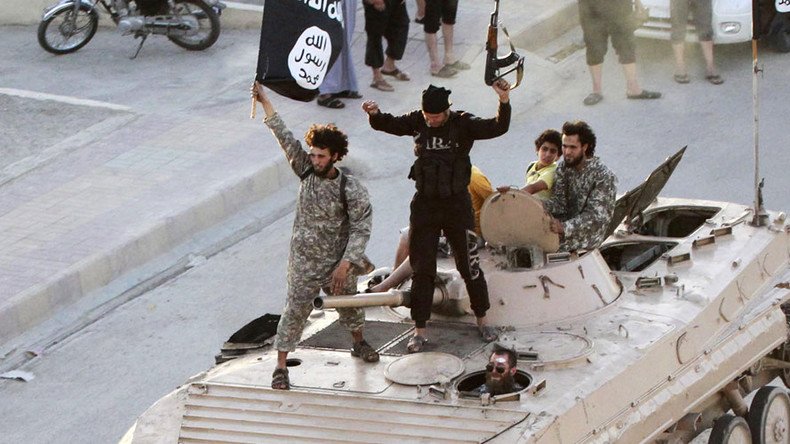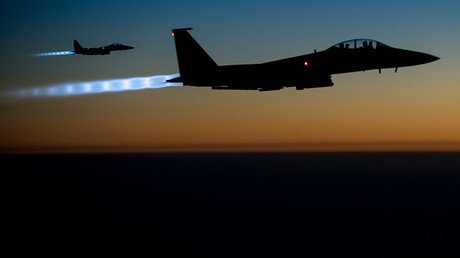‘ISIS terrorists may sneak into US from Western Europe’

Islamic State terrorists infiltrated Western Europe through migrant flocks and the US is going to have the same problem unless it does something about the visa waiver program from these countries, says Michael Maloof, a former Pentagon official, told RT.
The eventual victory over Islamic State (IS, formerly ISIS/ISIL) could lead to an increase of terrorist attacks in the West, FBI director James Comey said earlier in the week.
“At some point there is going to be a terrorist diaspora out of Syria like we’ve never seen before,” he told a cybersecurity conference at Fordham University.
“Not all of the Islamic State killers are going to die on the battlefield.” Some of them, he added, could end up in the US.
RT: How realistic is Comey’s prediction?
Michael Maloof: Comey’s prediction is right on. As ISIS loses territory, they’re going to be conducting more and more terror attacks. They’ve been actually training people to come back into the West and create this type of climate that we’re now seeing. They’ve infiltrated through migrant hordes that are coming into Western Europe. Unless we do something about the visa waiver program from these countries we’re going to have the same thing here. Even Americans who have gone out and come back in - we don’t know who they are. That can also create a problem. The US can’t identify all of them. We know some of them. And there are hundreds of them.
RT: Is there really a way to truly defeat IS, which appears to be more than a physical embodiment of a terror group, but an ideology?
MM: You can’t defeat an ideology until you get Muslim themselves to come up and basically say: “This can’t go on. We’ve got to stop it.” However, there’s an immediate problem, and that’s people coming up out of nowhere, lone wolves, hitting soft targets.
RT: How can the FBI hope to begin to track down those single actors?
MM: Part of the problem too is that ISIS is very good with multimedia means and social media. And it’s encrypted. The FBI director has admitted that they can’t break it. And we’re not getting cooperation from telephone companies or Facebook, or any of those. Because they think that it’s a violation of personal rights. But if they could get in and figure out the encryption... Then they can begin to track down those lone wolves. But then it might be too late. You see, these guys will start moving very rapidly. Move on their own. And that strategy that ISIS has is to leave everything up to the individuals to do what they’re doing.
RT: These people, they don’t have to go to Syria. They’re just indoctrinated by the online media…
MM: What you’re having here are thugs, who are beginning to put on the terrorist mantle because it gets them attention. And they’re going to be using other resources. They may not be using guns and knives alone. They may be using buses, going down a main street, a truck of some kind down the middle of New York City on Times Square. It can happen anywhere and anytime.
RT: Defeating IS in the Middle East would definitely require a lot of bombing, which will certainly lead to large numbers of civilian casualties. Isn’t that the very thing that provokes creation of new terrorist groups?
MM: It has and the recent bombings that have been going on in Syria, hitting a lot of innocent civilians in a highly condensed area. That’s really a recruitment tool for ISIS. And ISIS has picked up on that, using it to their advantage. You don’t want to be using aerial bombing on high-density populated areas. And also they’re using them for shields. That’s also going to be happening. You can see in Aleppo [the civilians] are trying to get out, but ISIS isn’t allowing it. What we’re doing is helping to recruit for ISIS.
RT: What role might the new leadership in the US, which will take office early next year, play in the fight against ISIS?
MM: I think it’s going to depend upon the leadership. If you listen to Donald Trump, he wants to go in. It’s going to be a quick deal. It’s not going to be necessarily quick because if you go to these highly populated areas it requires troops on the ground. Hillary Clinton, she seems to be a little more hawkish in terms of ISIS. I don’t know what she’s going to do, frankly. I don’t believe she’s going to commit troops. It’s really going to mean ultimately, I think, the US is going to have to start working with Syria and Russia to defeat the immediate problem of ISIS itself and then try to repatriate those areas that were occupied and try to build up a whole new network of social well-being for the survivors. And create these areas of no bombing.
The statements, views and opinions expressed in this column are solely those of the author and do not necessarily represent those of RT.














